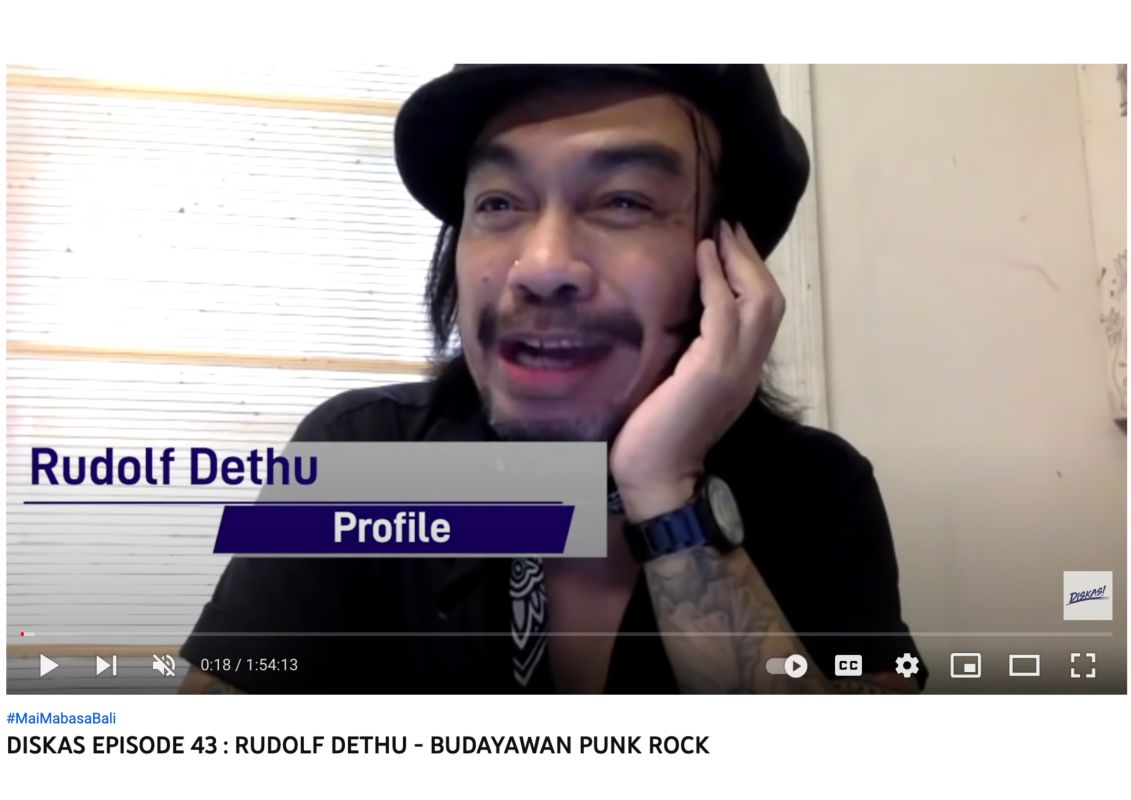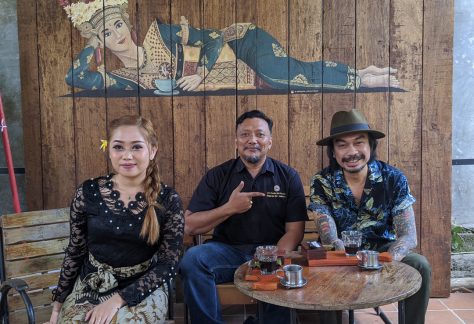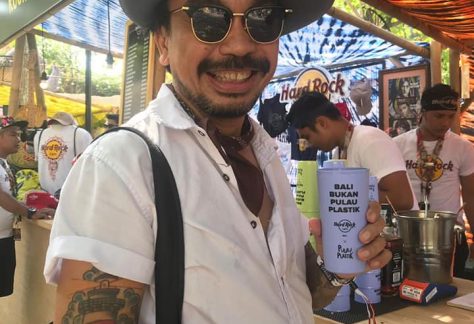What is punk rock? Is it colored, spiky hair held up by glue? Is it abrasive three chord rock ânâ roll played at breakneck speed? Is it leather pants, pierced noses and discordant noise atop irate, socially conscious lyrics? Or is it something much more, a symbol of an independent mind frame that goes beyond all of these stereotypes?
Punk rockâs bad reputation is not new. Even a half-century after the birth of the culture, punk rockers still face a barrage of negative perceptions from the people whose ideologies the movement has railed against for decades.
It is perhaps this strident adherence to image and ideology that got 65 punk rockers in Banda Aceh arrested for their unorthodox appearance. The incident was a reminder of exactly why punk originally came into existence: to rid the world of archaic notions and suspicion of anything different.
Many âseniorâ punks (theyâre not âold,â just âolderâ) have spent the better part of their lives in various forms of a punk rock existence, but have since moved on to seemingly more conventional lives. Thereâs nothing conventional, however, about the ideals they live by. Socially conscious and spiritually independent, the âolderâ generation of punk rockers lives up to the adage of âonce a punk, always a punk.â

Rudolf Dethu spent more than 10 years managing the successful Balinese punk band Superman Is Dead, with its brand of fiery pop-punk. Along the way, he worked to get the band to release numerous albums with a variety of independent and major labels, arranged concerts abroad and tried to encourage the bandâs fans to be mentally independent in a culture that discourages such thinking.
Rudolf Dethu with Superman Is Dead, the early days
Dethu was in his mid-30s when he walked away from his job managing the band and now leads a simpler life with his wife and child. He works independently in education and the arts, and has lived in countries including China and Australia.
âIâm quite involved with education, running a music foundation, organizing festivals to celebrate creativity, writing and generally running in fields of ideas, going through concepts,â he says. âIâm basically trying to [assist others in] breaking from the prison of thought.â
The 44-year-old fell in love with punk rock during his high school years in the early â80s. The barrage of unofficial compilation albums being released locally at the time introduced the young Dethu to punk rock mainstays such as the Sex Pistols, The Saints, The Dead Boys and The Damned, among many others.
âIt started with an accompanying feeling of being cool, but turned into something far more serious due to its ethos of resistance, fighting against the mainstream, denying conformity, being a liberal and an individual of sorts, being independent and learning to say âno,ââ he says.
Punk, Dethu says, spoke to him because it was everything that Indonesian culture railed against. It was a rallying call of complete and utter independence.
âPunk was a complete contradiction of this culture that preaches submission toward the majority â meaning always saying âyesâ to keep the peace â consensus and communalism,â Dethu explains/ Indonesiaâs culture of âgotong royongâ (âmutual cooperationâ), he adds, often leads to a tradition of followers being manipulated âlike deaf goats.â
Mohammad Rino Akbar, who has dedicated more than 10 years of his life as the frontman of the Jakarta hard-core punk act Rage Generation Brothers, or RGB, is an old-school punk with no plans of shedding his rebellious skin. He originally listened to heavy metal, and remembers the moment punk rock grabbed him.

âI fell in love with punk through the Sex Pistolsâ record âKiss This,â The Exploitedâs âTroops of Tomorrowâ and the Ramonesâ âMondo Bizarro,âââ he says of the albums that first grabbed his attention.
Rino, as he prefers to be called, studied the punk culture ferociously, and decided in 1996 that he wanted to form his own band, âwhich still exists today.â
âPunk was a culture. Whereas Metal was merely a genre,â he says. The 36-year old Rinoâs financial survival depends on his independent ideals. He sells budget-friendly musical instruments and a variety of fashion items such as shoes, hoodies and shirts that his own independent clothing line produces. He also imports other branded music merchandise.
William Kusumadi, who is in his late 30s, is another dedicated punk fan who spent his youth as a fixture on the local punk scene. His resume includes everything from being a roadie, manager and promoter for punk bands from the â90s, as well as acts that still exist today.
Like Dethu and Rino, Willy fell for punk through the Sex Pistols, and soon found himself obsessed with post-punk bands with darker imagery, like Joy Division and The Birthday Party.
âPunk spoke to me perhaps around my early high school years, after my grandfather died. I was kind of a rebel without a cause then,â Willy explains. To live off his passion, Willy began writing about music and movies for magazines, and served as a music producer for different radio stations.
Like many of the older generation of punks, however, Dethu, Rino and Willy soon grew disenchanted with how punkâs ideologies were misinterpreted by the new breed, whose understanding of punk rock ethics was as authoritarian and unbending as what it originally set out to fight against.
âWhen Green Day played a concert in Jakarta [in 1996], I was initially impressed that the punk rock styles local music fans had adopted â with their mohawks, pin-adorned shirts, nails everywhere and padlock necklaces â were possible in this country of rules,â Dethu says.
But his early enthusiasm quickly subsided after he learned how the underground punk rock scene operated. There was a deterioration of independent ideals that other punk subcultures all over the world also experienced.
âI began to see the peer pressure that was occurring in the scene by those self-billed authorities of what is and isnât allowed in the punk rock and underground music world,â he says. âIf it were merely younger kids trying to figure out their identity, that would have been acceptable. But punk rock here became something like an organized religion, where there were scholars who had the authority to declare an unquestionable fatwa and had absolute veto power.â
Dethuâs experiences were hands-on. As the manager of a commercially successful punk rock band, he and the band faced challenges and accusations of âselling outâ from puritans. They would meet âpunk rock policeâ who would act, according to Dethu, like the âShariah police, trying to enforce some sort of regulations of what was acceptable or not in the scene.â
Dethu and the band scoffed at these rules. âRegulations? There is no such thing in punk rock. Arenât we tired of being force-fed rules from the day we are born? Bound by the law, scolded by parents, dictated to at school, stared at by the police, banned from doing anything by religion, shackled to societyâs norms? And now there are punk rock police?â Dethu says.
Rino speaks of punk rock âposersâ without any vitriol, saying that every fan starts as one, but eventually develops his or her own punk character. âItâs up to us to get rid of that tag by trying to âupgradeâ our knowledge and understand punkâs roots. Itâs about how far you are willing to evolve,â he says, adding that as long as âthe hard-liners stay on their side, and me on mine, then thatâs fine. Variety is better than passivity.â

For many, the local punk rock scene lost its credibility after it began trying to regulate one of its most controversial ideologies.
The concept was called âstraight edge,â which was based on a song by hard-core punk band Minor Threat and became a strict set of guidelines for living oneâs life.
Straight edgers refrain from drinking, smoking and using drugs. More than a few adherents also abstain from promiscuous sex, follow a strict vegan lifestyle, donât drink caffeine and even stay away from prescription drugs.
âTo do any of those things is a personal choice,â Dethu says. âBut to follow it blindly is funny, because we are essentially a straight edge country already. In the States, being straight edged would mean going against the norms, but over here it is essentially being part of the mainstream; itâs a complete misunderstanding of the most basic punk rock ideals.â
And that might just be the difference between punks who eventually âgrow upâ and grow out of punk, and those who continue to carry the torch. One tries to outrun the rules by falling right back into them, while the other manages to take punkâs ethos to heart, without calling it anything more than limitless freedom.
Says Dethu, âI carry punk throughout my days. Itâs how I escape the shackles and life and stay an independent being.â
*This article is written by Marcel Thee and was firstly published on Jakarta Globe, January 08, 2012. To read the original click here






